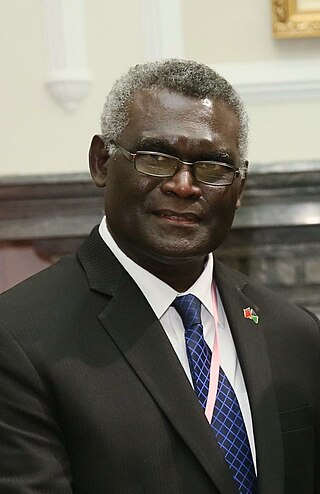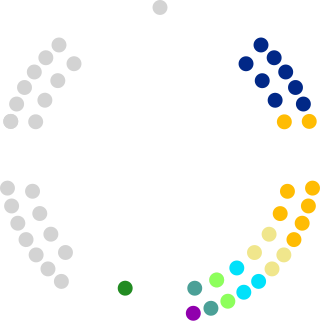
Politics of Solomon Islands takes place within the framework of a parliamentary representative democratic, constitutional monarchy. Solomon Islands is an independent Commonwealth realm, where executive power is exercised by the government. Legislative power is vested in both the government and a multi-party parliament.

Solomon Islands is a country consisting of six major islands and over 900 smaller islands in Oceania, to the northeast of Australia. It has a land area of 28,400 square kilometres (11,000 sq mi), and a population of approximately 700,000. Its capital, Honiara, is located on the largest island, Guadalcanal. The country takes its name from the wider area of the Solomon Islands (archipelago), which is a collection of Melanesian islands that also includes the Autonomous Region of Bougainville, but excludes the Santa Cruz Islands.

The governor-general of Solomon Islands is the vice-regal representative of the Solomon Islands' monarch, currently King Charles III, in Solomon Islands. The governor-general is appointed by the monarch after their nomination by the National Parliament by vote, although the monarch is not bound to accept that nomination for appointment. The functions of the governor-general include appointing ministers, judges, and ambassadors; giving royal assent to legislation passed by parliament; and issuing writs for election.

The Regional Assistance Mission to Solomon Islands (RAMSI), also known as Operation Helpem Fren, Operation Anode and Operation Rata, was created in 2003 in response to a request for international aid by the Governor-General of Solomon Islands. Helpem Fren means "help a friend" in Solomon Islands Pidgin. The mission officially ended on 30 June 2017.

Solomon Islands elects on the national level a legislature. The National Parliament has 50 members, elected for a four-year term in single-seat constituencies.

Sir Peter Kenilorea KBE was a Solomon Islander politician, officially styled The Rt Hon. Sir Peter Kenilorea as a member of the Privy Council of the United Kingdom. He was the first Prime Minister of an independent Solomon Islands, from 1978–1981, and also served a second term from 1984–1986.

The Solomon Islands Liberal Party (SILP) was a political party in the Solomon Islands.

The British Solomon Islands Protectorate was first declared over the southern Solomons in 1893, when Captain Gibson, R.N., of HMS Curacoa, declared the southern islands a British protectorate. Other islands were subsequently declared to form part of the Protectorate.

Manasseh Damukana Sogavare is the sixth and current Prime Minister of the Solomon Islands, serving since 24 April 2019. He previously held the office in 2000–2001, 2006—2007 and 2014–2017; in all he has served over nine years as prime minister. Before becoming prime minister, Sogavare served in the National Parliament representing East Choiseul since 1997.

The National Parliament of Solomon Islands has 50 members, elected for a four-year term in 50 single-seat constituencies.

The monarchy of Solomon Islands is a system of government in which a hereditary monarch is the sovereign and head of state of Solomon Islands. The current monarch and head of state since 8 September 2022, is King Charles III. As sovereign, he is the personal embodiment of the Crown of Solomon Islands. Although the person of the sovereign is equally shared with 14 other independent countries within the Commonwealth of Nations, each country's monarchy is separate and legally distinct. As a result, the current monarch is officially titled King of Solomon Islands and, in this capacity, he and other members of the royal family undertake public and private functions domestically and abroad as representatives of Solomon Islands. However, the King is the only member of the royal family with any constitutional role.

Honiara is the capital and largest city of Solomon Islands, situated on the northwestern coast of Guadalcanal. As of 2021, it had a population of 92,344 people. The city is served by Honiara International Airport and the seaport of Point Cruz, and lies along the Kukum Highway.

General elections were held in the Solomon Islands on 4 August 2010. The election date was announced in May 2010 by Prime Minister Derek Sikua. Although the announcement was deemed to be premature, as only the Governor General has the authority to announce the election date upon the advice of the Electoral Commission, the election date remained the same.
East Honiara is a parliamentary constituency electing one representative to the National Parliament of Solomon Islands. With an electorate of 30,049 in 2006, it is by far the most heavily populated constituency in the country, being the only one to consist in more than 20,000 voters. It is one of three parliamentary constituencies in the country's capital city, Honiara - the other two being Central Honiara and West Honiara.

In the Solomon Islands, the Leader of the Official Opposition is the leader of the largest political party in the National Parliament that is not in government. The title of "Leader of the Opposition" is common to the Commonwealth realms and several other Commonwealth countries, though in Solomon Islands it is specifically defined by the Constitution. The Leader of the Opposition appoints and leads a Shadow Cabinet. The current Leader of the Opposition, since December 2014, is Jeremiah Manele.

General elections were held in the Solomon Islands on 19 November 2014. Independent candidates won 32 of the 50 seats in the National Parliament, with the Democratic Alliance Party emerging as the largest party with seven seats.

General elections were held in Solomon Islands on 3 April 2019. They were the first general elections since the RAMSI mission concluded in 2017. On 24 April 2019, Manasseh Sogavare was elected by the 11th National Parliament as Prime Minister of Solomon Islands.

The 1984 Rhode Island gubernatorial election was held on November 6, 1984. Republican nominee and Cranston mayor Edward D. DiPrete defeated Democratic nominee Anthony J. Solomon with 60% of the vote.










